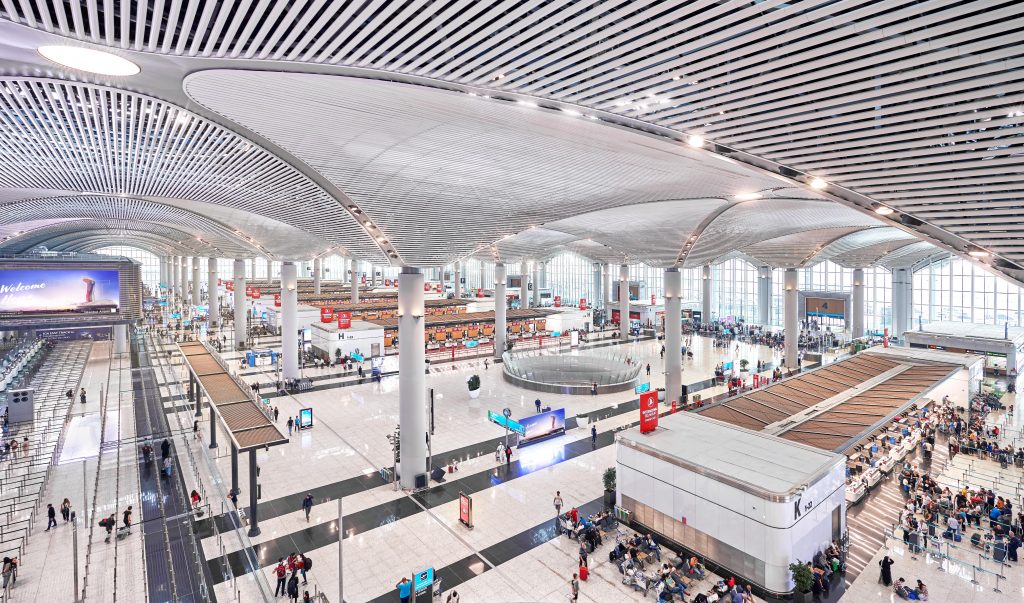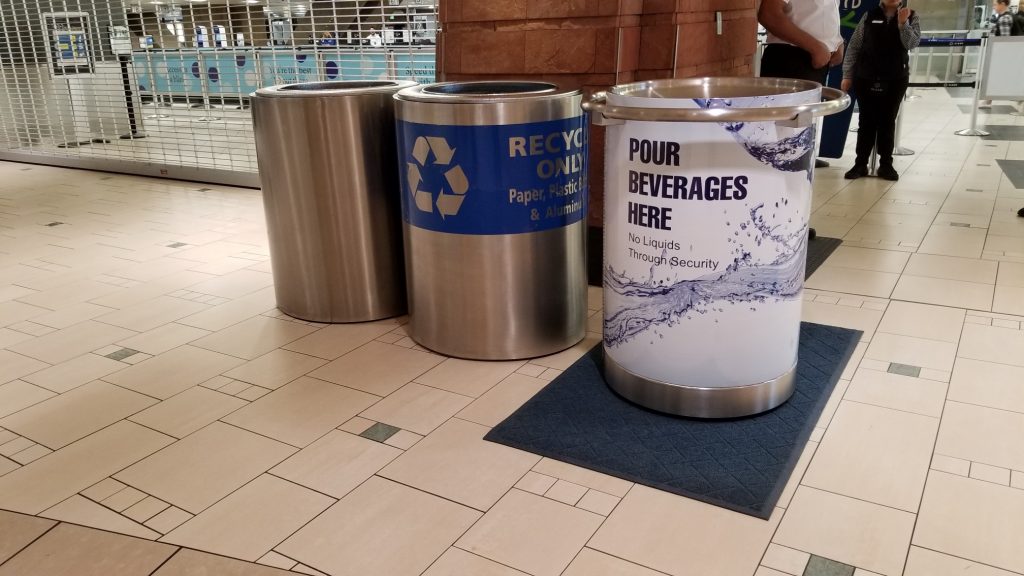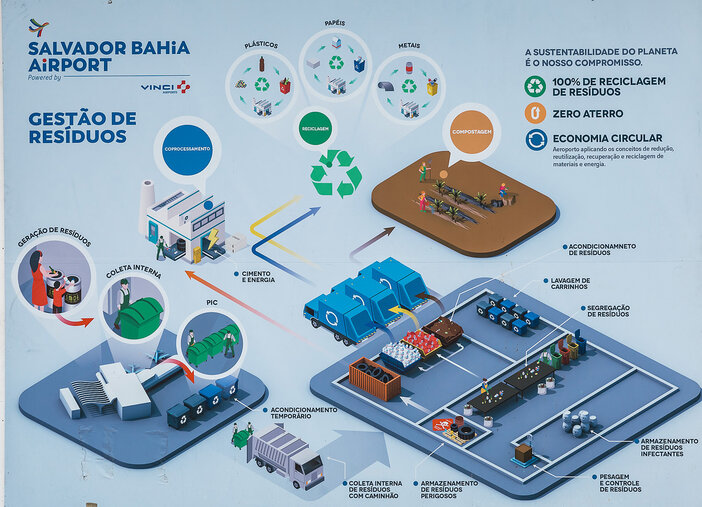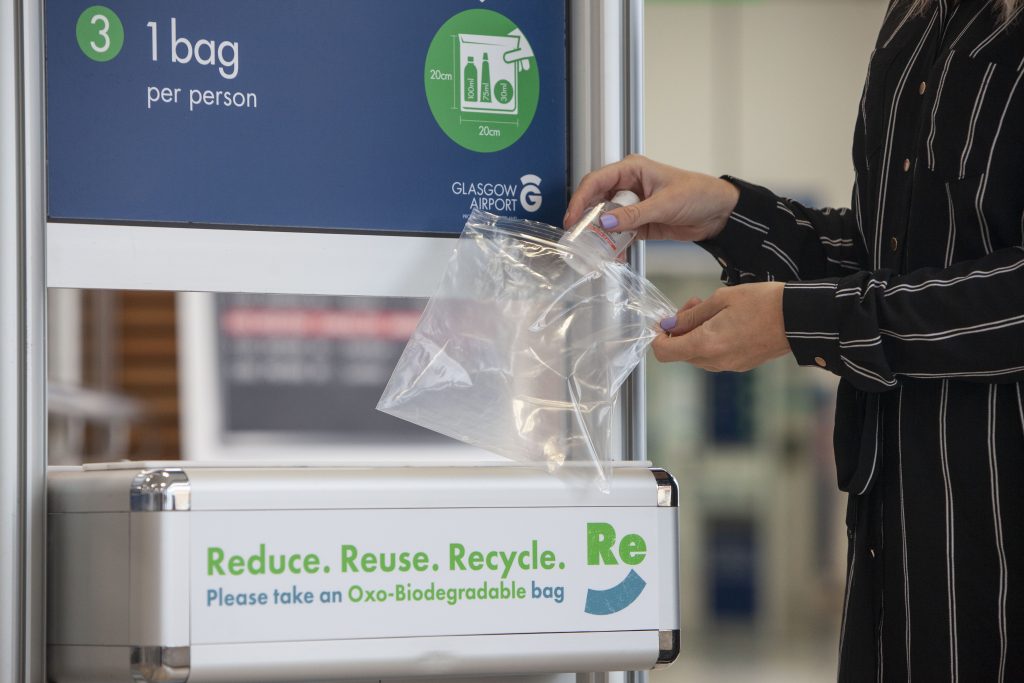The first airport to win Turkey’s Zero Waste Certificate, Istanbul, considers sustainability fundamental to its future. All of the airport’s activities are based on international sustainability standards, and zero waste is seen as a critical success factor.
Key to the airport’s certification was the sorting of waste, according to Ülkü Özeren, advisor to the chief executive officer and leader of the project. Istanbul sorts waste into five categories: paper/cardboard, packaging, glass, organic and domestic. The airport’s entire waste management infrastructure has been designed to facilitate recycling, and all operating companies have signed a Zero Waste Declaration. Istanbul generates 100 tons of waste a day; according to Özeren, 30% of this is now recycled.
In addition to sorting, working toward certification prompted the airport to review the reasons for waste generation, in a bid to prevent or minimize it. Staff and partners have responded well to the zero-waste drive. “All parties operating at the airport share our understanding and enthusiasm,” says Özeren. Projects such as Waste to Art have helped raise awareness of waste management. The airport also collaborated with the Mind Your Waste Foundation on a public zero-waste awareness video and photographic project, Are You Aware?. The Kollekt app, launched recently in collaboration with the United Nations Development Programme, Coca-Cola Foundation and Nature Conservation Center, enables passengers to collect points and win prizes for disposing of waste in the correct bin.
Özeren adds, “We understand that state-of-the-art infrastructure supported by technology is important, but it must be supported by awareness projects and tools if we want to achieve stakeholder engagement and successful waste management results.” Training was also crucial to becoming a zero-waste airport, to create waste management awareness that would lead to better sorting at source. Operator iGA recommends that all companies operational at the airport receive training. “Our desire to leave a clean and developed Turkey for future generations and a world that is fit to live in lies at the core of all of this work,” explains Özeren.

The zero-waste journey
Covid-19 may be at the top of every airport’s agenda today, but for many, effective waste management remains a priority. In 2018 the UK’s London Gatwick was the first airport to achieve Zero Waste to Landfill certification from the Carbon Trust, and the work continues. “Since then we have increased our direct reuse and recycling rate from 54% in 2017 to 71% in 2019, with the remaining 29% sent for off-site waste-to-energy recovery,” says head of sustainability Rachel Thompson. “Our recycling system covers all dry mixed materials, such as dry paper and cardboard, all empty bottles, cans and other beverage cartons, plastic bags and sheeting. In addition, 60% of clothing discarded in bins is sent to charity shops for resale, along with discarded suitcases, umbrellas, pushchairs [strollers] and sports equipment; the other 40% of clothing is sent to be recycled into fibers.”
Although the pandemic has forced Gatwick to pause some recycling initiatives, it has prompted others, with the introduction of strict separation and handling protocols for PPE and general waste across the airport.
Part of San Francisco International Airport’s strategic plan is to be zero waste by 2021. Asked about progress toward this, director of sustainability Erin Cooke says, “Our current waste diversion trajectory demonstrates that significant action must be taken for zero waste, or 90% diversion from landfill, to be achieved. While zero waste by 2021 remains a priority for the airport, new waste challenges consistently emerge.” Among these challenges, according to Cooke, are new waste streams such as single-use face masks and gloves.
Salvador Bahia Airport in Brazil set out to become a zero-waste-to-landfill facility in 2018, when just 1% of the airport’s waste was recycled, the remaining 99% destined for landfill. Environment manager Rodrigo Tavares explains, “The first step was to establish progressive annual goals for the airport’s recycling index: 25% in 2018, 50% in 2019, 75% in 2020, and zero waste to landfill in 2021. We tackled it aggressively and actually became a zero-landfill airport in January 2020.”
For Salvador Bahia, a Vinci-operated airport, a key step was installation of a new waste management center, fully integrated with the waste operation flow. The facility is responsible for the receipt of full containers, the segregation of waste, the packaging of hazardous and infectious waste, the sanitization of containers and the delivery of recovered waste.
“The Zero Waste Plan [ZWP] is an important piece of San Diego International Airport’s Sustainability Management Program,” comments Brendan Reed, director, airport planning and environmental affairs. The ZWP provides a framework to eliminate or reduce the generation of non-durable materials at the airport. By 2035, the airport plans to have achieved a 10% reduction in total discarded materials; 90% of waste diverted from landfill; and ‘true zero-waste or equivalent third-party certification’.
Looking even further ahead is Phoenix Sky Harbor International Airport. It is owned and operated by the City of Phoenix, which has established a goal of zero waste by 2050. Jennifer Maples, aviation superintendent for the Facilities and Services division, City of Phoenix, explains that the city’s goal is 40% waste diversion by the end of 2020. “Phoenix Sky Harbor has met and exceeded that goal, with a cumulative diversion rate of 49.69% at the end of our 2019/2020 fiscal year. The Airport Recycling Program continues to realize incremental gains toward the goal of zero waste,” she says.

Still innovating
Achieving or even maintaining zero-waste status requires ongoing innovation. Gatwick, for instance, plans to evaluate smart-bin technology designed to encourage less waste. The airport is also looking at whether some types of waste might be suitable for conversion into jet fuel.
Initiatives implemented by the San Diego County Regional Airport Authority pre-pandemic include a zero-waste cart, which provides employees with reusable plates, cups and utensils, cutting down on single-use items. The authority also began a pilot with Goodwill Industries of San Diego to install an Unattended Donation Center on airport property, enabling staff to donate unwanted household items. Lost and Found staff now also donate thousands of unclaimed items that would otherwise have been sent to landfill.
Salvador Bahia is also tackling single-use plastic. By December 2021, the airport hopes to launch a plastic-free program, where sub-concessionaires provide plastic packaging and cutlery only when requested by customers.
San Francisco has recently completed its custodial and tenant green cleaning program, which requires the use of safe, non-toxic cleaning supplies that are still effective in the face of viruses such as Covid-19. “Furthermore, these products are often purchased in bulk, thereby reducing end-use waste,” continues Cooke.
Having identified liquid at security checkpoints as a substantial generator of waste, Phoenix Sky Harbor launched a liquid collection program where passengers’ leftover drinks are diverted from the waste stream. Under normal traffic conditions the scheme recovers approximately 10 tons of would-be waste a month. The airport plans to launch a Green Tenant Program in 2021, designed to encourage tenants in waste reduction and other sustainability initiatives. Finally, Maples notes, “We are developing a system of promoting, tracking and reporting repurposed or reused items such as furniture, appliances and other community-use items. Not only will this divert from landfill, with the associated savings, but some items may generate revenue through salvage companies. If reused on-airport, this will reduce replacement costs.”
According to Claire Waghorn, sustainable transition leader at Christchurch International Airport, 2020 has provided the opportunity for a major rethink on waste. “In early 2020, we started really thinking about how best to design and practice as part of a circular economy system,” she explains. “This led to two major review projects: sustainable procurement and how we approach waste.
“Christchurch has divided its waste contracted services into two parts – removal and minimization, involving two separate contractors. The airport aims to cut waste volumes and waste streams, and to increase what can be included in our organic waste. In the next couple of months we hope to complete the business case for a new waste minimization specialist to help co-design our waste minimization strategy,” says Waghorn.

Tried and tested
What would these airports say to counterparts considering embarking on their own zero-waste journey? For Gatwick’s Thompson, it’s important to look closely at where non-reusable materials can be sent. “Seek innovation through competitive tenders, then test the options presented, including for regulatory compliance. The solutions need to work and be resilient,” she says.
In San Francisco, it was a case of ‘measure what you manage’. Erin Cooke explains, “Our work starts with baselining and includes consistent tracking. Identifying where waste is generated and characterizing the composition of the waste stream highlights the most impactful waste reduction generators and influences prioritization of specific materials.
“Start small,” she recommends. “Focusing on a single waste source at a time may seem insignificant, but can create important waypoints, including those upstream, that make hitting zero seem less daunting. Another easy win is simply making zero waste a design guideline for any new building or tenant improvement you undertake.”
Rodrigo Tavares of Salvador Bahia suggests a change in thinking. “When we stop looking at waste as garbage, we realize the extremely high value that this raw material has and see the inefficiencies in our processes,” he says. “My advice for airports that seek to become landfill-zero zones is to organize the operational flow of waste and to pass on the costs associated with the generation and treatment of waste to each generator.”
Ultimately, says Tavares, “More important than being a zero-landfill facility is not generating waste. Airports should focus on reducing waste generation.”

